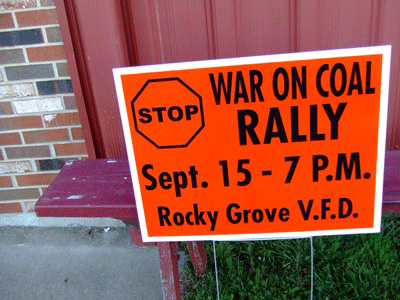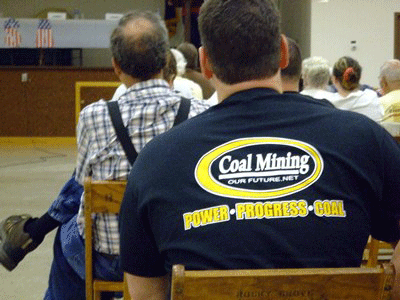Coal Under Fire
Air Date: Week of October 5, 2012

A sign for a "Stop The War On Coal" rally in Franklin, PA. Around 100 people attended the rally. (Photo: Ann Murray)
Locals in Coal country say the Administration is attacking their jobs and livelihood. But coal's slipping popularity as a fuel is mainly due to economic pressures. Anne Murray of the Allegheny Front report.
Transcript
CURWOOD: It’s Living on Earth, I'm Steve Curwood. Concerns about the economy and jobs are driving the election in different ways around the US, and when it come to Appalachia, the environment is right in the middle of the debate, thanks to coal. Coal faces a slew of new rules from the Obama Administration.
So in coal states like Pennsylvania, West Virginia and Virginia, there are plenty of billboards, rallies and ads as coal plants and mines shut down and new projects are stalled.
But as Ann Murray of the public radio program Allegheny Front reports from Northwestern Pennsylvania, there is much more to the change of fortune for coal than changing regulations.
[SOUNDS OF POLITICAL RALLY]
MURRAY: The Rocky Grove Fire Hall in Franklin, Pennsylvania is buzzing with people on a mission. Carol Mulrey organized this evening’s political rally with six of her friends. She says President Obama is waging a war on her coal-dependent community and he has to go.

The crowd at the rally listening to a speaker. (Photo: Ann Murray.)
MULREY: The current administration is putting coal through the EPA out of business.
MURRAY: Mulrey's worried about Joy Global, one of Venango County’s biggest employers.
MULREY: They make underground mining machines and if there are no mines, guess what, there are no jobs in our area.
MURRAY: Joy Global has already laid off 200 people because of the slow economy. Mulrey thinks new EPA pollution standards unfairly target mining operations and coal-fired power plants and more jobs will be lost. Across the hall, Gary Dubois, a longtime mining engineer, is selling lawn signs that say “stop the war on coal.” He says Mr. Obama's EPA has overstepped its bounds.
DUBOIS: We have administrators, non-elected officials completely bypassing what our elected officials do and that’s to make laws so they’re completely overreaching it, yes.
MURRAY: Dubois says his brisk multi-state sale of anti-Obama signs and T-shirts, indicates the frustration in hard-hit coal communities. Alpha Natural Resources recently announced it will close mines in Pennsylvania, West Virginia, and Virginia and cut more than a thousand jobs companywide. The news isn’t good.
[NEWS SOUND EFFECTS]
REPORTER: It's all part of a strategy to shift business away from power plants to overseas steel mills. One official said they are making the move because of stiffer EPA regulations and a drop in the demand for coal.
MURRAY: With the demand for coal dropping, some of the biggest names in the coal industry and the GOP are financing aggressive efforts to defeat President Obama. The American Coalition for Clean Coal Electricity has spent about 12 million dollars for pro-coal TV ads. Other groups are using the Internet.
AD: Obama has a war on coal. He’s not letting up. He is harming the economy and the American people. He’s going to bankrupt them.
MURRAY: Although the United Mine Workers of America disavows the “war on coal” language, the union, which backed Mr. Obama in 2008, remains uncommitted this year. That's according to Dan Kane, UMW's International Secretary-Treasurer.
KANE: In 2012 we have not made an endorsement. It's primarily because of the regulations and the activities of the EPA. We can't mine coal if there's no place to burn it.
MURRAY: The UMW estimates EPA's Mercury rule that will go into effect in 2015 will put a quarter of a million coal and coal related jobs at risk. That's because they say it will be too expensive to retrofit older coal burning plants. The Union also complains that EPA has made it nearly impossible to build new plants under a new greenhouse gas regulation. Dan Kane says to meet the CO2 emission standard, future coal-fired facilities would have to capture and bury their carbon.
KANE: Whether or not that can be done commercially, it can't right now and it doesn't make sense for the EPA to require technology that isn't commercially available.
MURRAY: But many US power companies have long planned to close some of their aging, inefficient coal-fired plants. The US Energy Information Administration or the EIA says one out of ten coal fired plants will shut down in the next few years. Allen Beamon, energy analyst with EIA, cautions that plant closings are complicated.
BEAMON: When you talk about retiring a plant, it's really a complex decision. You're not just looking at any single factor. There's no single straw that broke the camel's back. You're looking at coal prices, you're looking at electricity demand growth, you're looking at natural gas prices.
MURRAY: Electricity demand in many parts of the country is the lowest it's been in decades. And in the last four or five years, low natural gas prices - depressed by an abundance of shale gas, have rocked the US energy market says Beamon.
BEAMON: If you look over the last 50 or 60 years, coal power plants have accounted for nearly half or slightly more than half of the generation in this country. They were the work horses of the fleet. But the economics have changed now with gas prices as low as they are today and with the efficient gas plants that are available.
MURRAY: For the first time ever, gas and coal are neck and neck as the fuel of choice for electricity generation. The US Environmental Protection Agency says economic factors like these have changed coal's position in the energy mix - not malicious intent to target a fossil fuel. The EPA would not talk on tape but said in an email to the Allegheny Front, quote:
“Coal is still expected to generate more of America’s electricity than any other fuel source. However, market conditions in the power sector are driving business decisions that are completely independent from these long-overdue pollution standards.”
Back at the rally in Franklin, Pennsylvania, citizens want to scrap the agency.
RALLY SPEAKER: Could you tell me what you think the chances of getting rid of the EPA is?
[APPLAUSE]
RALLY SPEAKER: Is it possible?
[APPLAUSE]
RALLY SPEAKER: I think it actually…everything all relies on November 6th.
MURRAY: Republicans and 17 Democrats in the US House of Representatives aren’t taking any chances. The last thing they did before taking a break for the elections, was pass a package of bills to reduce EPA's regulatory reach. The White House has threatened to veto the bill if it makes it through Congress. For Living on Earth I'm Ann Murray with the Allegheny Front.
CURWOOD: The Allegheny Front is a Pennsylvania public radio program.
Links
Living on Earth wants to hear from you!
Living on Earth
62 Calef Highway, Suite 212
Lee, NH 03861
Telephone: 617-287-4121
E-mail: comments@loe.org
Newsletter [Click here]
Donate to Living on Earth!
Living on Earth is an independent media program and relies entirely on contributions from listeners and institutions supporting public service. Please donate now to preserve an independent environmental voice.
NewsletterLiving on Earth offers a weekly delivery of the show's rundown to your mailbox. Sign up for our newsletter today!
 Sailors For The Sea: Be the change you want to sea.
Sailors For The Sea: Be the change you want to sea.
 The Grantham Foundation for the Protection of the Environment: Committed to protecting and improving the health of the global environment.
The Grantham Foundation for the Protection of the Environment: Committed to protecting and improving the health of the global environment.
 Contribute to Living on Earth and receive, as our gift to you, an archival print of one of Mark Seth Lender's extraordinary wildlife photographs. Follow the link to see Mark's current collection of photographs.
Contribute to Living on Earth and receive, as our gift to you, an archival print of one of Mark Seth Lender's extraordinary wildlife photographs. Follow the link to see Mark's current collection of photographs.
 Buy a signed copy of Mark Seth Lender's book Smeagull the Seagull & support Living on Earth
Buy a signed copy of Mark Seth Lender's book Smeagull the Seagull & support Living on Earth

